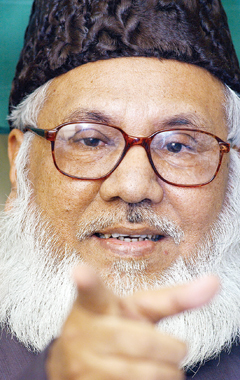 Motiur Nizami
Motiur NizamiDHAKA: Bangladesh hanged Islamist party leader Motiur Rahman Nizami today for war crimes committed during the 1971 war of independence to break away from Pakistan, the law minister said, in a move that could draw an angry reaction from his supporters. Nizami, head of the Jamaat-e-Islami party, was hanged at Dhaka Central jail after the Supreme Court rejected his final plea against a death sentence imposed by a special tribunal for genocide, rape and orchestrating the massacre of top intellectuals during the war.
Nizami, 73, a former legislator and minister, was hanged at 12.01 am local time, Law Minister Anisul Haq told Reuters. Thousands of extra police and border guards were deployed in Dhaka and other major cities to tighten security. Officials formally read the verdict to Nizami on Monday night after he was brought to Dhaka Central Jail from a prison outside the capital, senior jailor Jahangir Kabir told reporters. The Islamist leader did not say then whether he would seek any clemency, Kabir said, and prisoners are normally given a 24-hour window after verdict publication to formally apply. Nizami's lawyer told AFP last week that he would not seek any pardon as it would require him to admit crimes he was convicted of.
Jamaat has said the charges against Nizami are false and aimed at eliminating the leadership of the party. Nizami took over as party leader in 2000 and played a key role in the victory of an Islamist-allied government in the 2001 general election. The 1971 conflict, one of the bloodiest in world history, led to the creation of an independent Bangladesh from what was then East Pakistan.
Prosecutors said Nizami was responsible for setting up the pro-Pakistani Al-Badr militia, which killed top writers, doctors and journalists in the most gruesome chapter of the war. Their bodies were found blindfolded with their hands tied and dumped in a marsh on the outskirts of the capital. The trial heard Nizami ordered the killings, designed to "intellectually cripple" the fledgling nation.
He was convicted in Oct 2014 by the International Crimes Tribunal, which was established in 2010 by Prime Minister Sheikh Hasina's government and has sentenced more than a dozen opposition leaders for war crimes. Rights groups say the trials fall short of global standards and lack international oversight, while the government says they are needed to heal the wounds of the conflict. - Agencies










